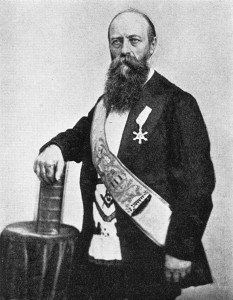le Plongeon, Augustus
Augustus le Plongeon (1826-1909) was born on Jersey in the Channel  Islands. He was a professional photographer and amateur archaeologist, who was an enthusiastic follower of Ignatius Donnelly’s idea that the alphabets of the Old and New Worlds were derived from a common Phoenician root via Atlantis. He also attempted to build on the efforts of Diego deLanda and Brasseur de Bourbourg to decipher the Mayan hieroglyphics. Both Donnelly’s efforts to link Latin with Mayan glyphs and deLanda’s attempt to identify the Mayan alphabet bore little fruit, reminiscent of Kircher’s equally futile struggle with Egyptian hieroglyphics.
Islands. He was a professional photographer and amateur archaeologist, who was an enthusiastic follower of Ignatius Donnelly’s idea that the alphabets of the Old and New Worlds were derived from a common Phoenician root via Atlantis. He also attempted to build on the efforts of Diego deLanda and Brasseur de Bourbourg to decipher the Mayan hieroglyphics. Both Donnelly’s efforts to link Latin with Mayan glyphs and deLanda’s attempt to identify the Mayan alphabet bore little fruit, reminiscent of Kircher’s equally futile struggle with Egyptian hieroglyphics.
Le Plongeon with comparable wasted dedication, attempted to convince the world that the Mayan language was in fact Greek. It would have been easier to prove that chalk is cheese. His attachment to the Mayan civilisation also inspired him to claim that they were the founders of the culture of Ancient Egypt via a trip westward through Asia and on to the Mediterranean. When it was eventually demonstrated that the Mayan culture was considerably younger than that of ancient Egypt, le Plongeon refused to relinquish his absurd ideas and continued to claim that the Maya were the oldest people on the planet(e).
Le Plongeon was alone in suggesting that Atlantis was a colony of the Maya.
He was also the creator of numerous other bizarre notions regarding such matters as Mu[439] and the last words of Christ. Incidentally, like Abbe Charles Etienne Brasseur de Bourbourg, Le Plongeon equated Mu with Plato’s Atlantis(e). He was convinced that the Mayan inscriptions on the pyramid of Xochicalco told the story of the destruction of Atlantis. It is remarkable that the author of such outlandish notions is quoted so frequently today, since few accept that he has contributed much to the advancement of knowledge. Jörg Dendl offers an extensive critique, in German, of Le Plongeon’s views(c) and worth a read.
Robert Schoch has suggested(a) that Le Plongeon, himself a freemason, had another agenda, namely, to establish links between freemasonry and the ancient Maya. A potted biography of Le Plongeon on the Internet(b) is also to be recommended.
Le Plongeon’s Vestiges of the Maya is available online(d).
(a) https://web.archive.org/web/20050530100238/https://www.robertschoch.net/articles/westernsphinx.pdf
(c) https://www.dendlon.de/Atlantis.html
(d) https://www.gutenberg.org/files/30752/30752-h/30752-h.htm
